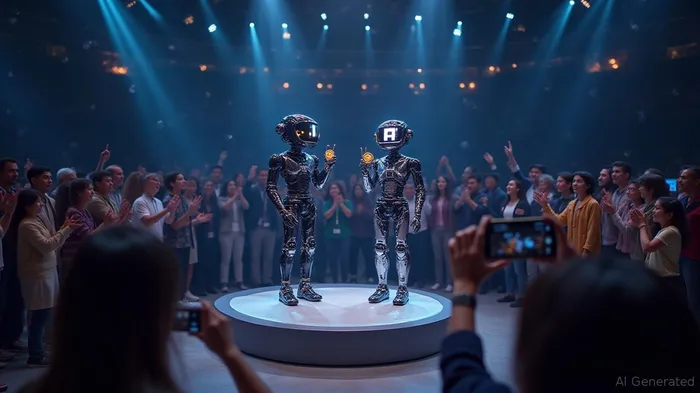AI Models from OpenAI and Google DeepMind Win Gold at 2025 IMO
In a groundbreaking achievement, AI models developed by OpenAI and GoogleGOOGL-- DeepMind have secured gold medal scores in the 2025 International Math Olympiad (IMO), a prestigious competition traditionally dominated by the world's brightest young mathematicians. This milestone underscores the rapid evolution of AI capabilities, particularly in complex reasoning and problem-solving, which could have far-reaching implications across various industries, including data security and market analysis.
The IMO is renowned for its challenging problems, and this year, the competition saw AI models from both companies achieving gold medal-level performance. This is a significant leap from previous attempts, where AI models relied on human translation to process problems. This year, both companies entered "informal" systems, allowing their AI models to directly ingest questions and generate proof-based answers in natural language, mimicking human understanding and problem-solving more closely. This breakthrough eliminated the need for human-machine translation, enabling the AI to process and solve problems autonomously. Both companies claim their AI models scored higher than most high school students and Google’s own AI from the previous year, highlighting the rapid pace of development in AI reasoning models.
Researchers involved in these IMO efforts stated that these gold medal performances represent significant breakthroughs in AI reasoning models, particularly in non-verifiable domains. While AI excels at tasks with clear, verifiable answers like math or coding, these new systems are showing promise in handling more ambiguous challenges, though true mastery of such tasks remains a future goal.
Beyond the impressive mathematical achievements, the IMO results have ignited another front in the ongoing AI Race: the battle for public perception and industry leadership. Companies are fiercely competing to appear ahead, an intangible but crucial fight for “vibes” that can significantly impact their ability to attract top AI talent. Many leading AI researchers come from backgrounds in competitive mathematics, making benchmarks like the IMO particularly resonant.
The announcements, however, were not without controversy. Google DeepMind raised questions about how OpenAI conducted and announced its gold medal performance, leading to a public squabble reminiscent of teenage rivalries. Google DeepMind’s CEO, Demis Hassabis, and other researchers criticized OpenAI for announcing its feat prematurely, shortly after the IMO announced student winners on Friday night, and before official verification. Thang Luong, a senior researcher at Google DeepMind and lead for their IMO project, emphasized that Google DeepMind waited to announce its results out of respect for the students and to adhere to the IMO Board’s request for official verification. Google worked with IMO organizers for over a year, seeking the IMO president’s blessing and official grading. OpenAI, conversely, stated they declined to participate in a formal IMO competition earlier but hired three former IMO medalists as third-party evaluators for their model’s performance.
This public disagreement highlights the intense competition. While Google certainly followed a more official and rigorous process for its score, the core takeaway remains: both companies are pushing the boundaries of what AI models can achieve, and the gap between them appears to be narrowing.
The significance of the Math Olympiad achievement extends far beyond bragging rights. It demonstrates AI’s growing capacity for complex reasoning, a critical step towards more sophisticated and versatile artificial intelligence. The fact that AI models can now perform at this elite level is a testament to the rapid advancements in the field. However, it’s also important to acknowledge current limitations. While these systems excel at problems with clear, verifiable answers, they still struggle with tasks requiring more ambiguous solutions, such as offering complex research assistance or making subjective judgments. The next frontier for AI models involves bridging this gap, enabling them to navigate the nuances of human-like reasoning and decision-making in less structured environments.
The intense AI Race continues, with OpenAI expected to release GPT-5 in the coming months, aiming to reinforce its perceived lead. Yet, the IMO results suggest a more evenly matched playing field than any single company might prefer to admit. This competition ultimately benefits everyone, as it accelerates the pace of innovation and brings us closer to truly intelligent AI systems that can tackle some of the world’s most challenging problems.
The remarkable gold medal performances by AI models from OpenAI and Google DeepMind at the International Math Olympiad mark a pivotal moment in AI development. Despite the competitive friction surrounding their announcements, the underlying achievement is undeniable: AI is rapidly gaining ground in complex reasoning, moving from theoretical possibility to tangible reality. This progress not only reshapes our understanding of machine intelligence but also hints at a future where AI could revolutionize every sector, from scientific discovery to everyday problem-solving.

Quickly understand the history and background of various well-known coins
Latest Articles
Stay ahead of the market.
Get curated U.S. market news, insights and key dates delivered to your inbox.

Comments
No comments yet